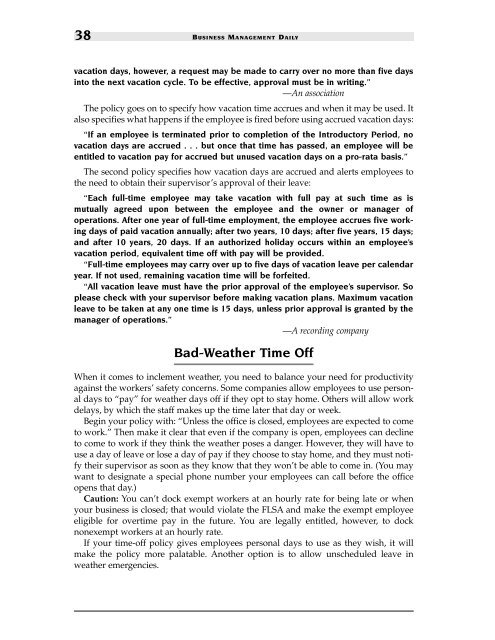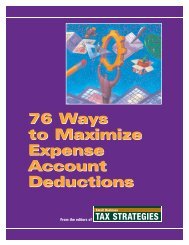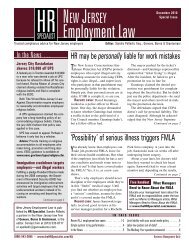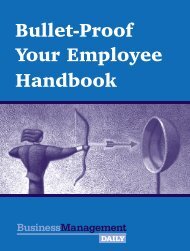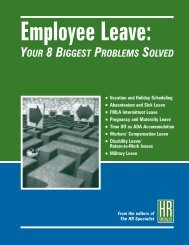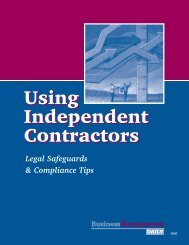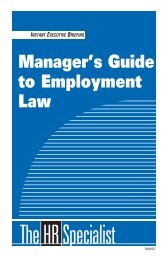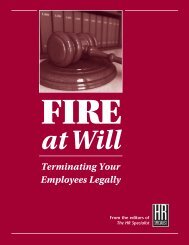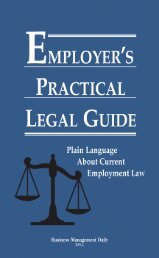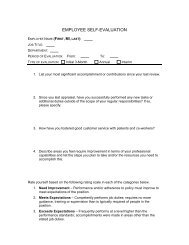sample policies
sample policies
sample policies
You also want an ePaper? Increase the reach of your titles
YUMPU automatically turns print PDFs into web optimized ePapers that Google loves.
38 BUSINESS MANAGEMENT DAILY<br />
vacation days, however, a request may be made to carry over no more than five days<br />
into the next vacation cycle. To be effective, approval must be in writing.”<br />
—An association<br />
The policy goes on to specify how vacation time accrues and when it may be used. It<br />
also specifies what happens if the employee is fired before using accrued vacation days:<br />
“If an employee is terminated prior to completion of the Introductory Period, no<br />
vacation days are accrued . . . but once that time has passed, an employee will be<br />
entitled to vacation pay for accrued but unused vacation days on a pro-rata basis.”<br />
The second policy specifies how vacation days are accrued and alerts employees to<br />
the need to obtain their supervisor’s approval of their leave:<br />
“Each full-time employee may take vacation with full pay at such time as is<br />
mutually agreed upon between the employee and the owner or manager of<br />
operations. After one year of full-time employment, the employee accrues five working<br />
days of paid vacation annually; after two years, 10 days; after five years, 15 days;<br />
and after 10 years, 20 days. If an authorized holiday occurs within an employee’s<br />
vacation period, equivalent time off with pay will be provided.<br />
“Full-time employees may carry over up to five days of vacation leave per calendar<br />
year. If not used, remaining vacation time will be forfeited.<br />
“All vacation leave must have the prior approval of the employee’s supervisor. So<br />
please check with your supervisor before making vacation plans. Maximum vacation<br />
leave to be taken at any one time is 15 days, unless prior approval is granted by the<br />
manager of operations.”<br />
—A recording company<br />
Bad-Weather Time Off<br />
When it comes to inclement weather, you need to balance your need for productivity<br />
against the workers’ safety concerns. Some companies allow employees to use personal<br />
days to “pay” for weather days off if they opt to stay home. Others will allow work<br />
delays, by which the staff makes up the time later that day or week.<br />
Begin your policy with: “Unless the office is closed, employees are expected to come<br />
to work.” Then make it clear that even if the company is open, employees can decline<br />
to come to work if they think the weather poses a danger. However, they will have to<br />
use a day of leave or lose a day of pay if they choose to stay home, and they must notify<br />
their supervisor as soon as they know that they won’t be able to come in. (You may<br />
want to designate a special phone number your employees can call before the office<br />
opens that day.)<br />
Caution: You can’t dock exempt workers at an hourly rate for being late or when<br />
your business is closed; that would violate the FLSA and make the exempt employee<br />
eligible for overtime pay in the future. You are legally entitled, however, to dock<br />
nonexempt workers at an hourly rate.<br />
If your time-off policy gives employees personal days to use as they wish, it will<br />
make the policy more palatable. Another option is to allow unscheduled leave in<br />
weather emergencies.


